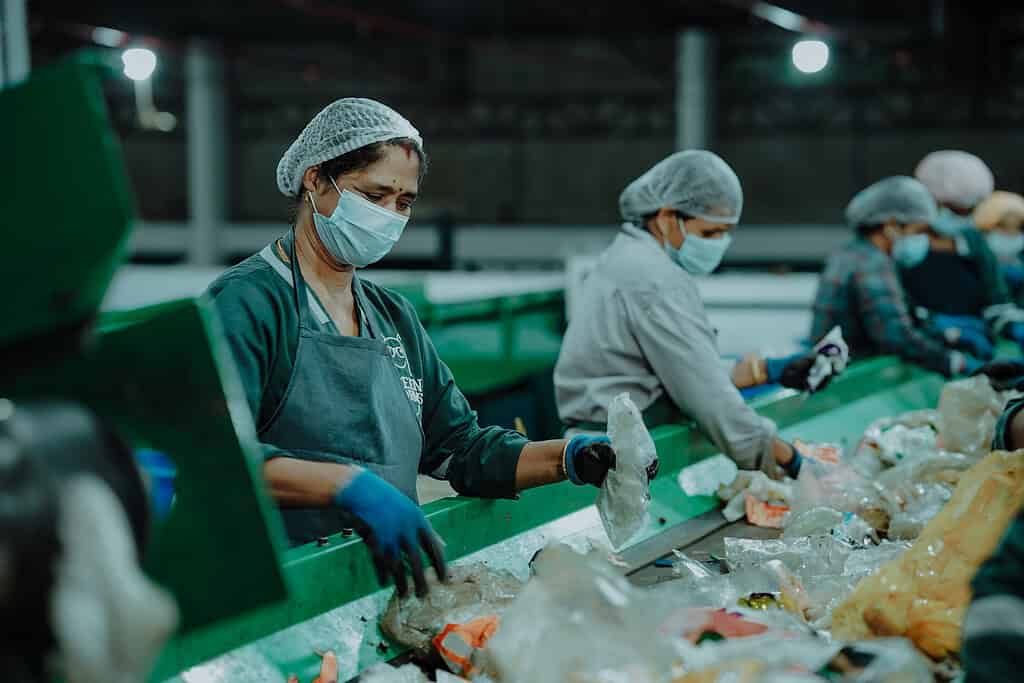Green Worms brings the Circular Economy to rural India
Acumen announces a new investment in a company that’s pioneering a scalable model for rural resource recovery by empowering women waste entrepreneurs
- Blog
- Dignified jobs
- India

A little more than a decade ago, during his time as a Gandhi Fellow, entrepreneur Jabir Karat was so taken aback by India’s mismanagement of waste that he signed up to be a waste picker, laboring in harsh, dangerous conditions, to immerse himself with the problem and the people who work in the industry. That experience led him back to his home village near Kozhikode city, on the southwest coast of India, where he launched a one-person business with an outsized ambition: to solve India’s waste crisis.
Fast forward a decade and Karat’s Green Worms is revolutionizing how rural communities manage waste at the last mile. The new Acumen investee helps divert plastic and other forms of dry waste from the environment into a formal supply chain and creates dignified jobs — and profitability — in the process.
The secret to Green Worm’s success is a multi-pronged partnership approach with local governments, women waste collectors organized through self-help groups (known as the ‘Haritha Karma Sena’), and domestic and global brands eager to embrace ethical sourcing and plastic offsetting services. The company provides in-depth assessments to Local Self Governments and helps them introduce new systems and processes to maximize waste collection, source-level segregation, and recovery of recyclables. Simultaneously, it engages the local community in education campaigns and provides women with the oversight, support, and training they need to deliver consistent waste collection and launch their own nano-enterprises as “waste-preneurs.”
By embracing transparency and a data-driven approach on the local level, Green Worms can also provide brands anywhere in the world with the information they need to satisfy stringent procurement requirements of ethical sourcing and extended producer responsibility.
“We’re on a mission to mitigate poverty and plastics in our environment,” says Karat. “Our process creates traceability, transparency, and most importantly safe and dignified jobs for women from socio-economically backward conditions.”
Built to scale
Since 2014, Green Worms has expanded from managing waste in one small village to ~100 villages, three towns, and two cities and islands in coastal India. It has recovered 67,000 tons of plastic, created more than 500 dignified jobs in their own facilities, and supported almost 3,000 women waste-preneurs.
More than 70% of the Green Worms’ jobholders report increased income and two-thirds report earning more than their previous jobs. Over 80% of the jobholders report that the way the community views their jobs has changed because of working at Green Worms. Almost 90% reported increased confidence and having the right level of autonomy at work.
Green Worms is one of only nine certified ocean-bound plastics collectors in India. In 2024, UNESCO’s Green Citizens initiative recognized Green Worms for its exemplary efforts in tackling plastic waste and empowering women through job creation.
To Green Worms, this is just the beginning. Despite its own success, India’s waste crisis continues to intensify. India generates more plastic waste than most other countries in the world, but its waste management industry is in such disarray that it has to import plastic waste from other countries to feed its domestic recycling industry.
Green Worms’ model can help on all fronts. The company has laid out ambitious plans to scale its current presence in Kerala and the Lakshadweep and Andaman Islands. It will use Acumen’s funding to build the Green Worms team at this critical moment, support investments in its recovery facilities, and jump-start its new foray into recycling of flexible plastic.
Why Acumen invested
To break the cycle of poverty, people need safe, stable jobs that pay fair wages. This belief is central to our investments in workforce development around the world, from Latin America to West Africa to India.
In India, we believe that it is possible to transform unorganized and extractive supply chains creating safe and dignified jobs for those who have been unable to escape the poverty trap. Green Worms epitomizes this possibility. Our investment in the company will help it continue its transformation of waste management in southwest India. It will also demonstrate to others a replicable model for partnerships with self-help groups and other collectives in waste collection, thus magnifying the opportunity for impact.
Our investment in Green Worms is part of our Green Growth Initiative, which is re-imagining India’s green job revolution by investing in companies that serve the millions of informal workers in the waste management system. Through formalization, technological efficiencies, and enhanced working conditions, our investees create sustainable and dignified employment while reinforcing environmental impact.
It’s hard to imagine a company that meets our criteria better than Green Worms.
“This is about more than dignified jobs,” says Acumen Associate Director, Portfolio – India, Paraag Sabhlok. “It’s about more than the Circular Economy. It’s about behavior change. Green Worms is building a movement that inspires change among waste generators, waste collectors, and across the value chain of stakeholders.”